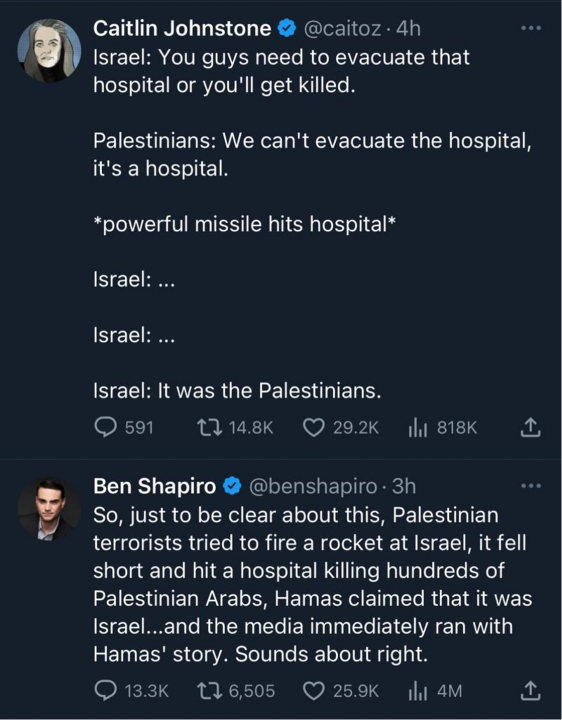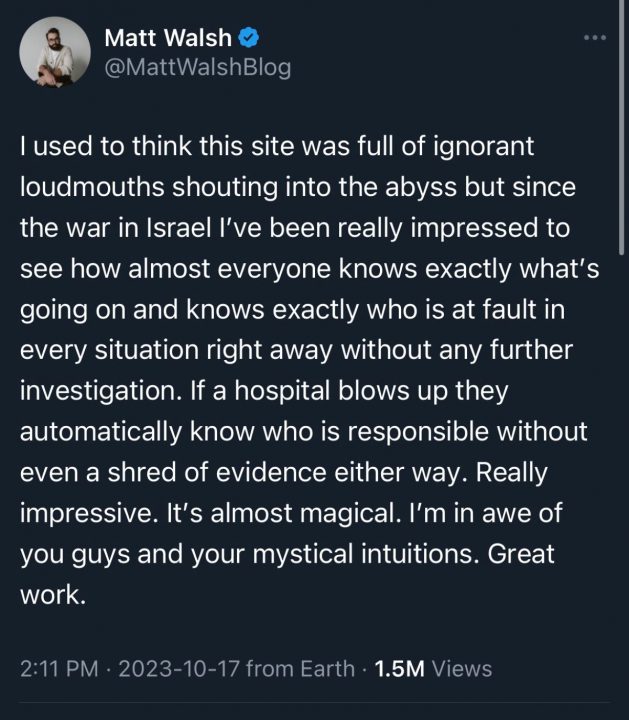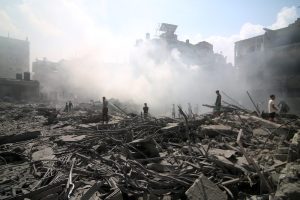
Sabahat Ali, Silicon Valley, USA
As the ground in Palestine trembles from ballistics and bombardment, the hearts of the world tremble along with it.
But how do you know that what you’re about to read is true?

The New York Times changes the headline of an article three times in one day for the same story, as new developments come in.
What may actually be an Israeli airstrike on civilians reaches our social media feed as a ‘terrorist attack’ by Hamas instead. Within minutes, Israel fires back, claiming that Hamas was the culprit. Hamas contends that it had nothing to do with it, insisting that these are the same age-old tactics Israel has always used to get away with the wanton murder of innocent Palestinian civilians. By the time we’ve finished our morning coffee, thousands of posts, hundreds of headlines and dozens of news outlets have chosen their version of the story.
And the rest of us are left suspended in speculation.
Misusing social media has the power to stir the pot of war in unknowable ways. Most people, it seems, react first and reason later, by which time irreparable damage has already been done.
The power to lay whole cities to ruin by pressing a button was once confined to world leaders. But in the days of desolation since October 7th, when Hamas attacked Southern Israel, have served as a chilling reminder of how each individual on social media possesses a great and terrible power – and an even greater responsibility.
The Battle for The Truth
Between influencers riding the wave of half-truths and triggering rhetoric to grow their platforms at the expense of the innocent lives, and the visible desperation of certain news agencies seeking to win over audiences and become the authority on the latest updates, trying to distinguish truth from falsehood has become almost impossible.
When both sides of the story post their version of events with the same confidence, who are you supposed to believe?

Beneath the rubble of buried truths and a litany of lies, all sides race to control the narrative.
A war’s greatest casualty is unmistakably the loss of innocent civilian life.
But a war’s greatest crime is the murder of truth.
The truth is the beginning and end of all common ground. It is the last string that ties us to any hope of reconciliation, de-escalation and – alien as the word may seem right now – peace itself.
What Islam Has to Say About It
The Holy Qur’an, the religious scripture of Islam, has enshrined a golden rule about the paramount need for fact-checking information before propelling it onward:
‘O ye who believe! if an unrighteous one brings you any news, investigate it fully, lest you harm a people in ignorance, and then be regretful for what you have done.’ [1]
Commenting on this verse, the Second Worldwide Head of the Ahmadiyya Muslim Community, Hazrat Mirza Bashiruddin Mahmud Ahmad (ra) states,
‘The Muslims are told that even when the exigencies of war necessitate prompt action to forestall a military move on the enemy’s part, rumours which are naturally very much rife in time of war should not be given ready credence. They should be tested and their correctness ascertained before action is taken upon them.’ [2]
Among other connotations, Lane’s lexicon places the word ‘faasiq’ squarely within the realm of ‘one who departs from the truth.’ [3] This means that if a ‘faasiq’ – someone known to forward unverified or false information – presents any data, it needs to be rationally dissected and tested against other sources about the same event.
Another dangerous habit within our own well-meaning circles is the urge to immediately forward reports as soon as they show up on our timelines.
The Holy Founder of Islam, Prophet Muhammad (sa), explained that ‘It is enough for a man to prove himself a liar that he goes on narrating whatever he hears (without first verifying it).’ [4]
If the Islamic philosophy of prudence were adopted, the entire narrative of the current conflict could be rescued from its own toxicity. The concocted lies, manufactured images and misleading videos are all dangerous blunders that – with some sensible fact-checking and a few critical moments of restraint – can be avoided.
To weaponize the paper-thin fragility of the world’s emotional state right now is nothing short of villainous. Yet even some of the biggest proponents of justice and interreligious, interracial harmony have fallen victim to retweeting unverified, unconfirmed claims and even actively posting false reports about Hamas and/or Israel, only to be called out later for propagating falsehood.
There’s a key difference between misinformation and disinformation. Misinformation is false or inaccurate information, while disinformation refers to deliberately malicious content aimed at spreading fear and suspicion among the masses.
When the madness of war meets the elusive powers of artificial intelligence, disinformation becomes all the more dangerous. Deepfakes – videos that can impersonate anyone and depict them doing anything – extend the capabilities of propaganda as far as the imagination will take us.
Disinformation peddlers and paid propaganda artists thrive on the chaos of widespread panic and confusion. If the Islamic safeguards around filtering information are employed, we can save entire generations from making the critical mistakes being made right now.
The Qur’anic Method of Filtering Information
Another form of untruth is looking at information through the lens of our own bias rather than as fact. The Qur’anic verse mentioned above speaks of at least three layers through which any information must pass before it is shared with others.
- If news reaches you from an unrighteousness source…’
As explained above, the word faasiq conveys a number of things. Where has the information come from? Is it a neutral source, or does it have vested interests? Does it have a history of proliferating half-baked truths or outright lies?
In essence, if the source of information suffers from any doubt or doubtful intent, be very careful with it. This is precisely why the Holy Prophet Muhammad (sa) famously advised ‘leave aside that which is doubtful for that which is not.’ [4]
2. If the fact / video / report passes the first test, then the Holy Qur’an teaches the science of prudent and judicious analysis of the information itself in the words ‘Fa Tabayyanoo…’ (investigate it fully).
Lane’s famous lexicon explains that the word ‘bayyana’ means ‘he made it apparent, manifest, evident, clear, plain, or perspicuous,’ and that ‘he looked at it, looked into it, considered it, examined it, studied it repeatedly, or deliberately, in order to know its real state by the external signs thereof.’ [5]
The Holy Qur’an invites us to ask the hard questions: Does the information make sense? How likely is it that the manner in which we’ve received the news is the whole truth? What do other sources say about it?
Finally, if our very best effort to distil the information through the first two layers gives us the green light, the Holy Qur’an invites us to consider a profound final point in the words ‘lest you harm a people in ignorance, and then be regretful for what you have done.’
The number of social media personalities who have proven the accuracy of these words in the last two months alone, by posting things they deeply regretted later after the full truth came out, is beyond anyone’s counting. These Qur’anic words convey the empathetic wisdom that sharing what we see and hear requires that even if a fact checks out as accurate, a final moment of pause and reflection is needed.
Could the way this information is conveyed have a reverse impact on the ones who will receive it? How will it impact vulnerable groups? Is this the right time for me to share it? Is there a better platform or authority to send this information to?

Emotions Should be Fuel, Not Anchors
In the midst of high-flying emotions, burning passions can blind us from recognizing that when we forward an unconfirmed source and it’s proven wrong or inaccurate, it injures even the noblest of causes. It casts a shadow of doubt on critical voices trying to help innocent Palestinian civilians.
When a video makes our blood boil, and we forward it without taking the necessary steps to verify its authenticity – especially if it’s later exposed as fake or misleading – what started out as a pure intention can actually hurt the cause.
Buying a few critical minutes of prudence and critical thinking to examine content before sharing it will actually bolster the cause for justice, not impede it. The blatant asymmetry of power and resources that the Israeli side enjoys paired with the disproportionate slaughter of innocent Palestinians already stacks the odds against innocent civilians who are being attacked.
Let’s make haste that is productive, not haste that weakens the case for the oppressed.
Islam is a solution to all of the world’s challenges and a clear path for humankind to grow and develop toward the most beautiful form of humanity. Even in the seventh-century Arabian desert, it brilliantly identified and offered real, practical remedies for the societies of all times. The sociological implications of information and the heavy responsibility we each shoulder is no exception.
If we’re really after the truth, then we have an enormous duty to treat each and every piece of information that falls into our lap with great care. Without putting it through the filter of our own common sense and crossing it against other sources, rather than helping the cause, we could easily end up accomplices in fanning the flames of war instead.
ENDNOTES
- The Holy Qur’an, 49:7
- Hazrat Mirza Bashiruddin Mahmud Ahmad (ra), The Five Volume Commentary, Under 49:7, footnote No. 3845,
- E. W. Lane, Arabic-English Lexicon (London: Willams & Norgate, 1863).
- Sunan an-Nasa’i, 5711, Book 51, Hadith No. 5714.
- E. W. Lane, Arabic-English Lexicon, (London: Willams & Norgate, 1863).
About the Author: Sabahat Ali is an imam of the Ahmadiyya Muslim Community in Silicon Valley, USA. He serves as a member of the editorial board and is also editor of The Existence Project for The Review of Religions.




Such an amazing article at the right time when it’s needed for all to differentiate Truth from Falsehood with Quranic references to not believe in everything you read especially in social media
There is a Ghanaian proverb that literally translates to “where the mouth can reach, the feet cannot follow.” Especially now with social media, information spreads like wildfire (and not everyone is fact-checking before passing each message on). We don’t realize the extent to which our individual words & actions can have a widespread impact — even a global impact. But, all praise to God, Islam has the answer for everything! Jazakallah khairan for this timely and informative article. May God Almighty protect us against spreading disinformation and perpetuating falsehood, Ameen summa ameen.
I couldn’t agree more with your points in this article. The insights you’ve shared are not only informative but also thought-provoking.
Mash’Allah, this is an excellent article, it is especially important for people who find themselves heavily one one side to read this and understand the importance of fact-checking and the pursuit of truth
Very informative article. It is unfortunate to see the amount of both misinformation and disinformation circulating around various media outlets, and the divide it is creating is evident. With any conflict where emotions run high, people often forget to think and verify before posting. Islam’s guidance on this matter is refreshing and a much needed reminder during these times.
I wonder if all the information was 100% accurate and people were only exposed to the truth, if a peaceful solution to the problem would be more feasible to achieve.
Very beautiful exposition of Islamic teachings on accuracy of information. A teaching mostly needed at this moment of Israel-Hamas conflict and highly useful in this information age
Very insightful piece